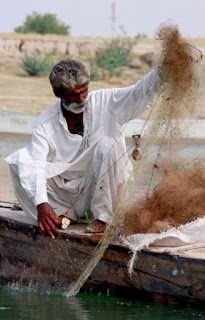Partner Institutes
|
|
| Newcastle University | Government College University, Faisalabad |
The mighty
Having been nurtured by
it for centuries, it is now an important responsibility for the region to
protect the Indus from total extinction. The
INSPIRE collaboration between the Government College University, Faisalabad and
Newcastle University, UK aims to
monitor the levels of pollution in the Indus using fish as an indicator.
Aquatic animals, particularly fish, accumulate metal toxins in their bodies and
hence are an excellent gauge of pollution in their external environment.
By devising strategies
to minimise toxin levels in the Indus , the
project will greatly improve the quality of life in the surrounding
communities, where contaminated water is one of the major causes of disease.
Moreover, they will be able to reap economic benefits from farming fish that is
safe for consumption.
The partnership hopes to
involve the local and national governments to devise a comprehensive awareness
campaign to control river pollution and help save one of the country’s greatest
natural resources.
Lessons learnt:
In the study area water pollution
is increasing through municipal and industrial wastes and return-agriculture
flows through drainage structures, so there is a great need of minimising the
pollution in this area. The growing agricultural crops in the surrounding area
of the River Indus are a source of pollution which is threatening the aquatic
life including fish.
Challenges faced:
The agricultural farmers
working in the areas are used to cropping around the River Indus for many years
are less willing to change their agricultural practices. It will take time to
convince and train them about the hazardous effects of the pesticides and
insecticides.
Impact:
This project will have
long term impact on reducing aquatic pollution by creating awareness in the
community about the hazardous effects of pollutants on fish growth and
production. This may increase the economy of rural community and ultimately of
country and help in reducing poverty in rural communities. At the end of
INSPIRE project 50 staff members of both genders will be trained in aquatic
genotoxicological research and more trained staff will be available at general
and public level for fish farming and educating agricultural farmers about the
hazardous and genotoxic effects of pollutants on aquatic fauna and flora including
Fish. The findings of this project will be published in various reputed
International Journals which will be the intellectual property of both HEIs.
Key contacts:
Dr. Abdul Shakoor Chaudhry, Newcastle University
a.s.chaudhry@newcastle.ac.uk, www.newcastle.ac.uk
a.s.chaudhry@newcastle.ac.uk, www.newcastle.ac.uk
Dr. Farhat Jabeen, Government
College University ,
Faisalabad
farjabeen2004@yahoo.co.in, www.gcuf.edu.pk
farjabeen2004@yahoo.co.in, www.gcuf.edu.pk

